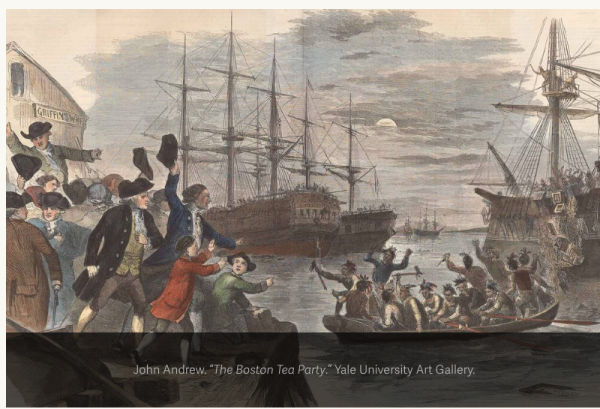December 5, 2023

Recalling a Kilkenny patriot and rebel on 250th anniversary of the Boston Tea Party
Near 6 p.m. on Dec. 16, 1773, thousands of people spilled from Boston’s Old South Meetinghouse into the frigid early evening air and onto rain-slicked cobblestones. At least 116 of them, likely many more, had draped themselves in blankets and darkened their faces with soot to disguise themselves as “Native Americans.” They streamed to Griffin’s Wharf, where three merchant ships –the Dartmouth, the Eleanor, and the Beaver – swayed and creaked at anchor, their holds bulging to the brim with 342 chests of East India Company tea.
As the crowd surged onto the wharf, the “Native Americans,” armed with axes, hatchets, and braces of pistols, surged aboard the Dartmouth, smashed open the casks, and began dumping their contents into Boston Harbor. Notably, at least one of the raiders protesting the British Parliament’s tax on tea hailed from Ireland.
Kilkenny born and raised Thomas White struck a blow against the Crown that night 250 years ago come Dec. 16, 2023. In the looming American Revolution, one would be hard-pressed to find a more fervent soldier in the cause of independence than the Irishman.
He was born on March 19, 1739, and at age 31 crossed the Atlantic to Philadelphia. A tailor by trade, he married Elizabeth Jones, who was 15 years younger than him. They moved to Boston shortly after their nuptials.
In their new city, White was caught up in the rising opposition to the Crown embodied by the Sons of Liberty. He was reputed to be a Freemason and member of St. Andrew’s Lodge, a hotbed of rebels. He climbed aboard the three merchant ships during the fateful three or so hours of the Tea Party and helped heave the 46 tons of tea into the harbor, cheered on by the thousands of onlookers clotting the dock.
White joined George Washington’s Continental Army when the Revolution erupted in 1775 and fought in the 2nd Pennsylvania Regiment until he was mustered out in 1781 or 1782 at the rebellion’s end, having survived the dreadful winter encampment at Valley Forge and numerous battles against the British Army.
After the war, he and his family moved back to Pennsylvania, where he became a farmer in the rural town of Robertsdale. Three of his sons served in the War of 1812, one perishing on duty and another dying of dysentery after capture by the British. Thomas and Elizabeth had 21 children, with several of them perishing at an early age.
White died on September 13, 1820, at the age of 81and was buried at Evans Cemetery, in Bedford County, Pennsylvania. Elizabeth lived nearly 25 years longer.
On the 4th of July 1899, a monument was dedicated at his gravesite in front of a throng gathered to honor the Kilkenny soldier, an event-poster inviting attendees to “do honor to the memory of the brave and patriotic hero of the Boston Tea Party and Revolutionary fame.” The “Thomas White Historical Association” placed a highway marker near the cemetery in 1973, the 200th anniversary of the Tea Party.
White’s native home, Kilkenny, commemorated him at the historic Rothe House and Garden in September 2023 as local dignitaries planted a white rose bush in his honor and dedicated a plaque. Wearing Colonial garb, Josiah George, assistant creative director of the Boston Tea Party Ships & Museum, played the role of the honoree.
On December 16 of this year, taking a moment to remember the Kilkenny man who dumped tea into Boston Harbor and fought valiantly in the cause of American Independence would be fitting on both sides of the Atlantic.

